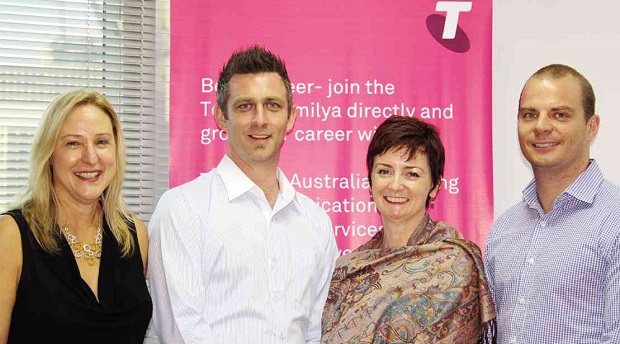Telecom’s diversity fosters creativity, agility, cultural IQ

TELSTRA expats, who chose to be Manila-based, testify to how workplace diversity fosters creativity and company loyalty.
Telstra-Australia’s ubiquitous telecom & information services company with customer service centers and partners in Metro Manila, Lipa, Cainta, Santa Rosa, Bacolod and Cebu-promotes diversity and inclusion in the workplace.
As part of a progressive yet profitable business strategy that fosters company loyalty and lateral thinking, the program has helped Telstra become one of the top ten listed Australian organizations and grab a niche in the Global Fortune 500.
Creative ferment
“We’re one of few companies in the Philippines that extend our health benefits to same-sex partners and common-law spouses,” says Cielo Narvaez, a gregarious Pinay change engagement manager.
Karyn “Westy” Westaway from Melbourne-a Telstra employee for 30 years who looks like Merryl Streep says Telstra’s diversity and inclusion program covers differences in gender, age, ethnicity, race, cultural background, disability, religion, and even background, life experiences, education, and more.
“As individuals, everyone’s got something to offer,” says Westaway, who as senior corporate affairs advisor is responsible for communicating the Telstra Philippines story to Australia.
“Only by having a diverse organization with diverse people can you be a great company because you use the best of everyone rather than being stereotypical where you get the same thinking. We need people with different ideas to make us that brilliant company.”
Agile roles
Among the expats in Telstra Pamilya (the name that the PH staff voted to call themselves), there are Caucasians and also those with Chinese, Vietnamese, and Indian origins.
Phillipa Dobbin, a coffee gourmet from Melbourne and general manager for transformation implementation, smiles and shares that she herself has Irish ancestry.
Dobbin’s family itself is new millennium-agile: a few months after moving to Manila in 2010, she and her husband decided that she’d be the breadwinner while he’d be the house dad taking care of home and their 11-year-old daughter.
Describing the Australian worldview, she says, “Culturally we’re very cynical of authority. We’re not hierarchical-we’re very egalitarian and that goes back to our history.”
Dobbin, who represents the Philippines in Telstra’s Diversity Council, cites the benefits—“I don’t see many cons, to be honest” she says of workplace diversity. These include innovation, progression, and employee satisfaction that “drive the right business outcomes.”
“Diversity is not just cultural or gender diversity. It’s personality, it’s work experience. We’re looking at people who are returning to work; those in the latter part of their career and are moving toward more part-time roles; mothers who are returning to the workforce; or people who are in their late 50s and in the twilight of their careers but who have wisdom and maturity that they can bring back.”
“One thing we want to introduce is ‘all-roles flex.’ Essentially, flexibility in the workplace is: can you work at home? Telecommuting, for example. Your role is not chained to a desk: your role is to get the job done. When you’re more flexible in work practices, you’re more productive.”
Cultural intelligence
Diversity in culture breeds a different mindset: one that accepts people as they are and acknowledges each individual’s unique gifts to a discussion. Dobbin describes it as “nonlinear” because of the recognition that there are often many ways of looking at the same situation.
Narvaez says her fellow Pinoys feel so proud to work in such an accepting, “relaxed” environment that many actually post social media check-ins when arriving for work.
Narvaez says, “I see it as lifelong learning. We learn from our Australian teammates about their language—that thongs to them are flip-flops for example—and we laugh about how we understand some words differently. And they too have a sincere desire to learn from us. We have an office ritual, Take-out Friday: everyone eats Filipino food like Aristocrat chicken barbecue or chicharon (pork rind) from Cebu.”
During informal get-togethers like these, Filipinos may hear about the latest adventures of Samuel “Sam” Gates, a process improvement lead from Brisbane, who likes to volunteer: he’s helped cheer up orphans and children with cancer via U! Happy Events; helped build a house in Cainta; and taken part in Oplan Hatid for Yolanda evacuees.
Or they could listen to cultural nomad Mark Cimdins (an athletic Latvian-Australian who met his Vietnamese-Canadian wife in Italy) who broke a foot while competing in Muay Thai in Marikina to raise funds for Haiyan (Yolanda) charity.
Gates is a former English teacher whose mild-mannered personality is a striking contrast to his very individual persona: he’s had an eyebrow pierced and an arm tattooed. He actively sought a Philippine assignment after two Filipino team leaders he met in Brisbane through Telstra’s relationship exchange told him, “Sam you work so much. You need to laugh more. Why don’t you laugh?” He says that, indeed, his life has changed because of “the Filipino effect”: he now finds it easier to laugh.
Gates smiles, “On my first day of work here, I had someone I’d never met before come running up to me and giving me a really big hug, saying ‘So nice to meet you!’ I was quite reserved at work! During the first introduction to my team, people asked if I was single, if I liked boys or girls. I was taken aback! And then I realized there was no malice. It was actually genuine interest and it was quite normal. And I started to relax!”
Cimdins, a senior project manager, says what he and his family love most about the Philippines are the people. The Filipinos they’ve met are “so friendly, so open, so accommodating, so inclusive, which is why I think it’s a great match between Australia and the Philippines from a cultural perspective.”
Workplace diversity for this quintessential Australian company is not just a means to satisfy its bottom line; it’s an end in itself. By celebrating the diversity of people and cultures, Telstra helps build a bridge to a bright connected future for all.
